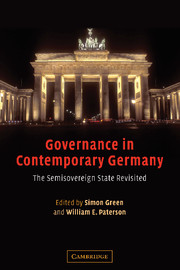Book contents
- Frontmatter
- Contents
- List of figures
- List of tables
- List of contributors
- Acknowledgments
- List of abbreviations
- 1 Introduction: Semisovereignty Challenged
- 2 Institutional Transfer: Can Semisovereignty be Transferred? The Political Economy of Eastern Germany
- 3 Political Parties
- 4 Federalism: the New Territorialism
- 5 Shock-Absorbers Under Stress: Parapublic Institutions and the Double Challenges of German Unification and European Integration
- 6 Economic Policy Management: Catastrophic Equilibrium, Tipping Points and Crisis Interventions
- 7 Industrial Relations: From State Weakness as Strength to State Weakness as Weakness. Welfare Corporatism and the Private Use of the Public Interest
- 8 Social Policy: Crisis and Transformation
- 9 Immigration and Integration Policy: Between Incrementalism and Non-decisions
- 10 Environmental Policy: the Law of Diminishing Returns?
- 11 Administrative Reform: Is Public Bureaucracy Still an Obstacle?
- 12 European Policy-making: Between Associated Sovereignty and Semisovereignty
- 13 Conclusion: Semisovereignty in United Germany
- References
- Index
1 - Introduction: Semisovereignty Challenged
Published online by Cambridge University Press: 05 June 2012
- Frontmatter
- Contents
- List of figures
- List of tables
- List of contributors
- Acknowledgments
- List of abbreviations
- 1 Introduction: Semisovereignty Challenged
- 2 Institutional Transfer: Can Semisovereignty be Transferred? The Political Economy of Eastern Germany
- 3 Political Parties
- 4 Federalism: the New Territorialism
- 5 Shock-Absorbers Under Stress: Parapublic Institutions and the Double Challenges of German Unification and European Integration
- 6 Economic Policy Management: Catastrophic Equilibrium, Tipping Points and Crisis Interventions
- 7 Industrial Relations: From State Weakness as Strength to State Weakness as Weakness. Welfare Corporatism and the Private Use of the Public Interest
- 8 Social Policy: Crisis and Transformation
- 9 Immigration and Integration Policy: Between Incrementalism and Non-decisions
- 10 Environmental Policy: the Law of Diminishing Returns?
- 11 Administrative Reform: Is Public Bureaucracy Still an Obstacle?
- 12 European Policy-making: Between Associated Sovereignty and Semisovereignty
- 13 Conclusion: Semisovereignty in United Germany
- References
- Index
Summary
The Semisovereign Model of Governance
In political science, every once in a while, a book is published which redefines the way scholars think about a social phenomenon, a policy, a concept or an institution. It is, however, particularly rare for a book on the politics of a single country to have a similar impact: it is notoriously difficult to capture adequately the links between institutions, history, cultural environment and policy outcomes at the same time. More importantly, it is even more unusual for such a book to be accepted by the indigenous community of political scientists as one of the definitive accounts of that country.
Peter Katzenstein's 1987 book, Policy and Politics in West Germany: the Growth of the Semisovereign State, is just such a contribution. Conceived of as an illustration of the limits of domestic state power, it locates institutional structures and policy outcomes in the Federal Republic of Germany (or West Germany before 1990) within the country's specific historical and societal context. Its central argument is that policy in West Germany was defined by ‘incremental outcomes’, a pattern which, moreover, remained broadly constant across changes of government. This stood in direct contrast, for instance, to the much more dramatic changes introduced by Margaret Thatcher after the Conservatives came to power in the UK in 1979. The tendency towards incremental outcomes, so the argument continued, was conditioned by the ‘semisovereign’ structure of the state, which sees decentralised state institutions pitted, often individually, against strong centralised societal organisations.
- Type
- Chapter
- Information
- Governance in Contemporary GermanyThe Semisovereign State Revisited, pp. 1 - 20Publisher: Cambridge University PressPrint publication year: 2005



